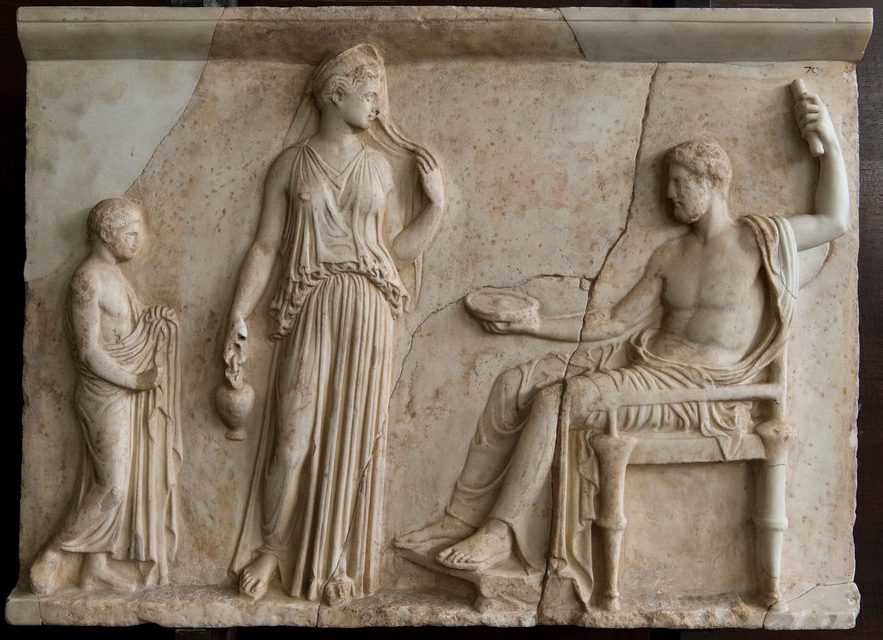A number of words commonly used in the English language come from Greek – some directly from Ancient Greek, but most through Latin, French and/or other languages. We recently published a 4-part series dedicated to these words, divided according to various fields (such as literature, science or religion) but did not include the multitude or medical and other health-related terms with Greek roots, as they deserved a separate article.
The foundations of medicine
The medical vocabulary of the English language (and many other Western languages) includes hundreds, if not thousands, of Greek words. This is owed to the fact that the Ancient Greeks were among the first to practice medicine in an organized (from organon “organ, instrument”) way, using observation and logical reasoning instead of supernatural explanations.
Many foundations of modern Western medicine lie in Classical Greece. The famous philosopher and scientist Aristotle (c. 384–c. 322 BC) and, above all, Hippocrates (c. 460–c. 370 BC), referred to as the “Father of Medicine”, played an instrumental part in establishing the field, and their theories (theoría, from theoro “to look at, consider, speculate”, from thea “view” + horo “to see”) continued to greatly influence medical practices until as late as the 19th century.
A number of words still used to this day (such as urethra, pneumonia or arthritis) first appeared in the writings of Hippocrates, while several more can be found in the works of Galen (129–c. 216 AD), a prominent Greek physician from Pergamon who had also exerted tremendous influence on the evolution of medicine.
 Left: Statue of Hippocrates in the Court of the Oxford Museum Wellcome (via Wikimedia Commons); right: ‘Portrait’ of Galen, by G. P. Busch, Wellcome Collection gallery (via Wikimedia Commons)
Left: Statue of Hippocrates in the Court of the Oxford Museum Wellcome (via Wikimedia Commons); right: ‘Portrait’ of Galen, by G. P. Busch, Wellcome Collection gallery (via Wikimedia Commons)
For the largest part, the medical terminology used today was developed in the 17th-20th centuries; words were created using prefixes and suffixes in Ancient Greek and Latin, on the one hand because the terms already existing came from Ancient Greek and Latin pioneers of medicine and, on the other hand, because these were considered the two languages that people of high intellect (and especially those with a high social status) should master.
It would be nearly impossible –as well as grim and somewhat pedantic (from paidagogos “teacher, pedagogue“, pais “child” + agogos “guide”)– to list each and every medical term that comes from Greek, from catheter, sepsis and rheumatism to sarcoma, colostomy or aphasia. We will thus list some of the most widely used terms that are generally known by people otherwise unfamiliar with the field of medicine.
Anatomy, bodily functions
Dissecting a human cadaver was regarded as taboo in Classical Greece – however, by the 3rd century BC, Hellenistic Alexandria saw impressive advancements in this field, thanks primarily to Herophilus of Chalcedon and Erasistratus of Ceos.
Hence, many parts of the human (and animal) anatomy (deriving from anatemno “to dissect” from ana “up, on” + temno “to cut”) come from Greek. This includes parts of the skeleton (skeletοs “dried up, withered” from skello “to dry up, parch”), such as the cranium (kranion “skull”), but mostly organs (from organon “organ, instrument”), such as the arteries (artería “windpipe; artery”), the stomach (stomachos “throat; stomach” from stoma “mouth”), the spleen, the thyroid (thyreoeidés “shield-shaped”, from thyreos “oblong shield” + eidos “form, appearance”), the urethra (ourethra, from ouron “urine”, the pancreas (from pan “all” + kreas “flesh”) and the tendons (from tenon “sinew, tendon”).

The adjective coronary, which describes some arteries and veins of the heart, comes from korone “sth curved; a type of crown” (where crown also derives from); the first part of the now-infamous coronavirus also comes from this word. Note that the word chest also derives from the Greek kiste “chest, box, basket”, although its use to denote the thorax (“breastplate, cuirass”) is not linked to the Greek roots of medical practices (but rather to its similarity with a box), while skin pores derive their name from poros “passage”.
Phlegm comes from phlegma “flame, inflammation” (from phlego “to set on fire”), and sperm from sperma “seed”, while hormone is derived from hormé “urge, impulse”. Metabolism comes from metavolé “change” (from metavallo “to alter”, from meta + vallo “to throw”); hygiene, on the other hand, derives from the female of the adjective hygieinos “related to/ good for health”, from hygiés “sound, healthy”.
The word gene derives from genea (“generation”) which derives from a form of the verb gignomai “to become, to be born”. The words genetic, genitive and genesis also derive from the same root. (Other phonetically similar words like “generate”, “general” or “gender” derive from the Latin “genus” which is a cognate of the Greek genos [“race, kind”] rather than deriving from it.) Embryo (the stage that precedes the development into a fetus) comes from the adjective emvryos “growing”, from en “in” + vryo “to swell, grow”.
 Left: Votive relief for the cure of a bad leg, with an inscription dedicating it to Asclepius and Hygieia, found on Milos; right: Hippocrates sculpture in front of Mayne Medical School, Brisbane (by Kgbo via Wikimedia Commons)
Left: Votive relief for the cure of a bad leg, with an inscription dedicating it to Asclepius and Hygieia, found on Milos; right: Hippocrates sculpture in front of Mayne Medical School, Brisbane (by Kgbo via Wikimedia Commons)
Medical conditions
The suffix “-itis” is used to describe a sickness or an ailment, usually is some particular part of the body; although usually combined with other Greek words, it can often be used with words of Latin origin (as in “appendicitis” or “gingivitis”). Examples include arthritis (from arthron “joint”), dermatitis (from derma “skin”), hepatitis (from hepar, genitive hepatos “liver”), and many more.
The suffix “-sis” or “-osis” also indicates a condition or status, often of a pathological nature, but also a process or increase; examples include scoliosis (from skolios “bent”), thrombosis (from thromvos “curdle”), sclerosis (from skleros “hard”), cirrhosis (from kirrhos “tawny”) and osteoporosis (from osteon “bone” + poros “pore”). Words ending in –pathy can also indicate a condition, deriving from pathos “pain, suffering”, e.g. encephalopathy, from enkephalos “brain” (from en “in” + kephalé “head”) and myopathy, from mys “muscle” (as opposed to pathos in the sense of “feeling” we find in words like apathy, sympathy, telepathy etc.).
Trauma is Greek for “wound” (from the verb titrosko “to wound”), and it has come to mean any serious physical injury, but also emotional wound. Symptom (symptoma) comes from sympipto “to fall together/upon, to coincide” (from syn “together” + pipto “fall”).
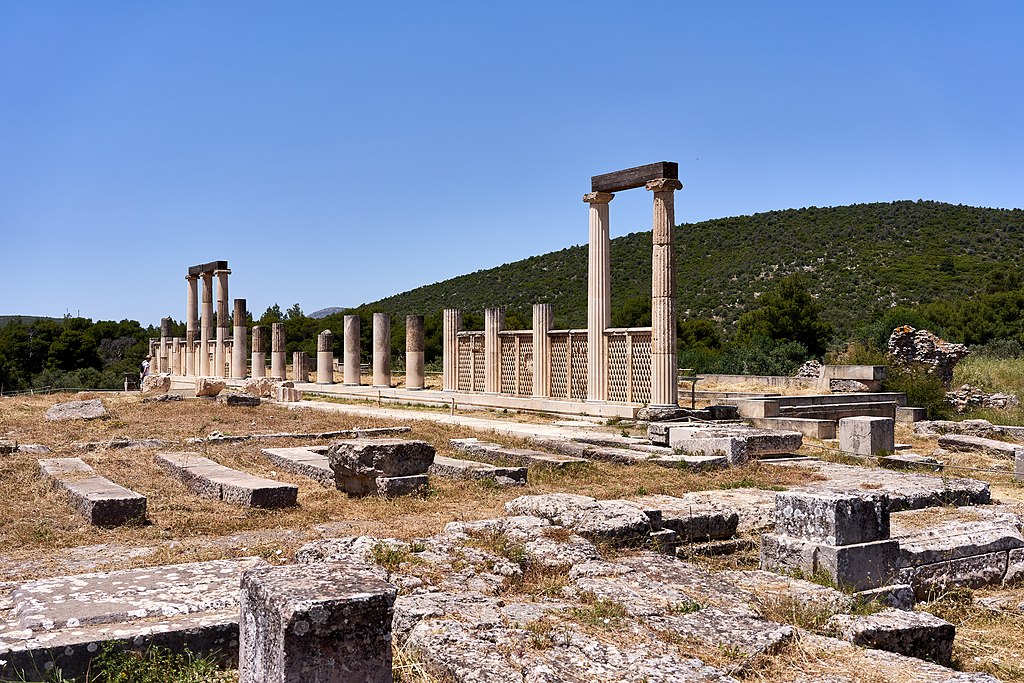 The stoa of Abaton or Enkoimeterion at the Sanctuary of Asklepios in Epidaurus, where the sick believed they could be cured by Asklepios, god of healing, during their sleep (by George E. Koronaios via Wikimedia Commons)
The stoa of Abaton or Enkoimeterion at the Sanctuary of Asklepios in Epidaurus, where the sick believed they could be cured by Asklepios, god of healing, during their sleep (by George E. Koronaios via Wikimedia Commons)
Some examples of various conditions named after Greek words include: acne (akmé “point, top), nausea (nausía “sea-sickness”, from naus “ship”), cyst (kystis “bladder, pouch”), asthma (“panting, laborious breathing”), cataract (katarrachtes “waterfall, flood; cataract”, from katarrasso “to pour down”, from kata “down” + arasso “to strike, dash”). Allergy was coined in 1906 by Clemens von Pirquet from allos “other” + ergon “work, activity”.
Some more serious ailments, diseases or chronic (from chronos “time”) conditions include sleep apnea (from the alpha privative [the prefix a-] + pnoé “breath”), celiac (from koilía “abdomen”) disease, aneurysm (from aneuryno “to dilate”, from ana “up” + eurys “wide”), pneumonia (from pneumon “lung”), diabetes (“a passer through; a siphon”), carcinoma (from karkinos “crab; cancer”) and coma (“deep sleep”). Paralysis derives from para “beside” + lyo “to loosen, untie”, while palsy also derives from paralysis (through French). The (now ubiquitous) term pandemic derives from pan “all, every” + demos “the people”, while epidemic comes from epi “upon” + demos and the adjective endemic from en “in”.
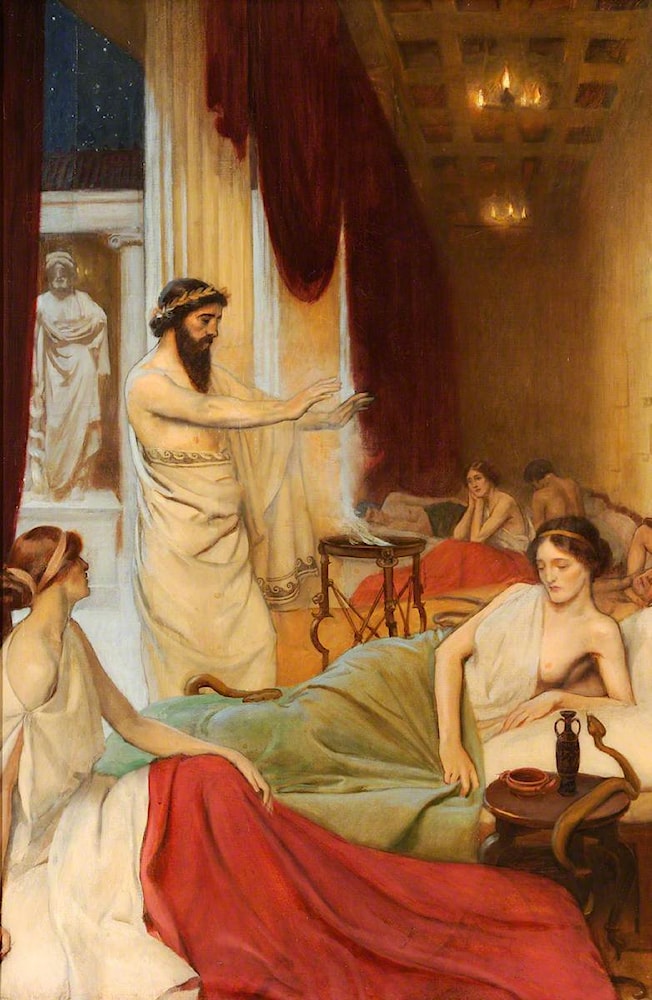
Medical professionals, procedures & pharmaceuticals
The word physician comes from the adjective physikos “pertaining to nature”, from physis “nature” (where physical and physics also come from). However, the term actually used in Greek to refer to a medical doctor is iatros, while medicine is called iatriké (both deriving from iaomai “to cure, heal”) – which is where the suffixes –iatry, –iatrist, –iatrician and –iatric come from, as in podiatrist (from pous, genitive podos “foot”), pediatrician (from pais, genitive paidos “child”) and geriatrics (from geron “elder person”).
However, the most common word used in the names of branches of medicine is –logy (and –logist), denoting “the study of sth” and deriving from logos “speech” (read Part 1 of our 4-part series for more on this frequently used suffix). Hence the terms cardiology (from kardía “heart”), gynecology (from gyné, genitive gynaikos “woman”), ophthalmology (from ophthalmos “eye”), pathology (from pathos “pain, disease”), oncology (from onkos “mass, volume; lump”), histology (from histos “web; tissue”), and hematology (from haima, genitive haimatos “blood”).
Surgeon is derived (through Latin and French) from cheirourgos (from cheir “hand” + ergon “work”), where the adjective chirurgical also comes from. Clinic comes from the adjective klinikos “of or pertaining to a bed; bedridden” (from kline “bed”, from klino “to lean, to incline”). Therapy (therapía “medical treatment”) comes from therapeuo “to attend, wait on; to cure, restore”, from therapon “attendant, aide, servant”, while doula also actually means “female servant”.
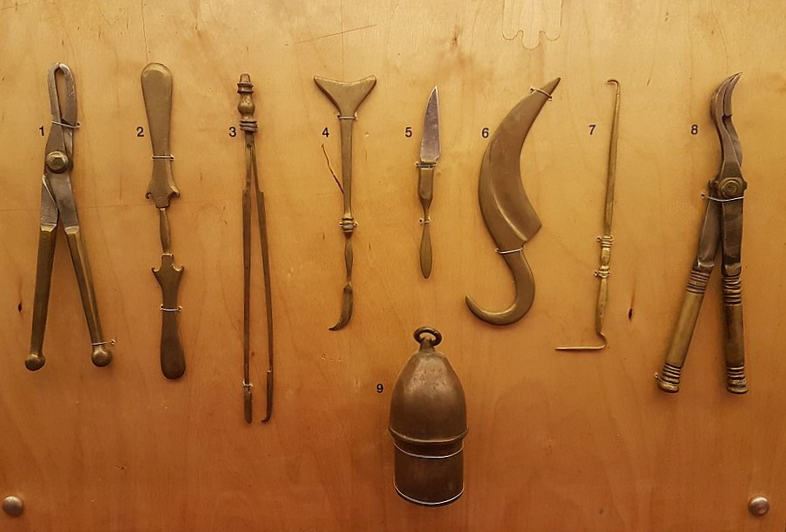
The word pharmacy (pharmakeía “the use of drugs”) comes from pharmakon “drug, medicine, potion”. Types of drugs with Greek names include antidotes (anti “against” + dídomi “to give”), which are healing agents that counteract the effect of poisons or other toxic (from toxon “arrow”, meaning “[poison] for use on arrows”) substances; hypnotics (from hypnos “sleep”); narcotics (from narke “numbness, torpor”); analgesics (from the alpha privative + algos “pain”); and anesthesia (literally “loss of feeling, of sensation”, from a– + aesthesis “sensation”).
Names of medical instruments, on the other hand, include syringe (syrinx “panpipes, tube; syringe”); stethoscope, coined in 1819 by René-Théophile-Hyacinthe Laënnec from stethos “chest” + skopeo “to look at, examine”; otoscope (from ous, genitive otos “ear” + skopeo); and thermometer, coined in the 1620s by Jean Leuréchon from thermos “hot” + metron “measure” (note that thermostat also comes from thermos + –stat, a suffix deriving from histemi “to stand, to set”).
Diagnosis literally means “discerning”, from dia “through” + gignosko “to learn, to know”, while prognosis comes from pro “before” + gignosko. Dialysis (litrerally “a separating or parting”, from dia + lyo “to loosen, untie”) is one of the very few words that has a completely different sense in Greek, where it means “dissolution” and even “disarray”. Euthanasia comes from eu “good” + thanatos “death”, while autopsy means “seeing with one’s own eyes” (from autos “self” + opsis “sight”), a sense it has also kept in Greek (where the word necropsy [nekropsía, from nekros “dead”] is used to describe the examination of a corpse).
Also note that the cervical screening test known as Pap test or Pap smear is named after its inventor, Greek physician Georgios Papanicolaou, who conducted pioneering medical research in the United States for nearly 50 years. The first part of his name is a very common prefix in Greek last names; it comes from papas, originally a term of endearment for a father, which became the colloquial term for a priest (“Pope” actually comes from this word – read more). Hence, “Papanicolaou” literally means (son/descendant) “of Father Nikolaos”.
We can also find forms of alternative or holistic (from holos “all, whole, entire”) medicine with Greek names, such as chiropractic (from cheir “hand” + praktikos “practical”, from prasso “to do”), osteopathy (from osteon “bone” + pathos “pain, disease”), homeopathy (from homoios “same, resembling” + pathos), hypnotherapy (from hypnos “sleep”) and aromatherapy (from aroma “seasoning, fragrant smell”) – these are, however, often dismissed as pseudoscience (from pseudés “false, untrue”) by skeptics (from skeptikos “thoughtful”, from skeptomai “to consider”).
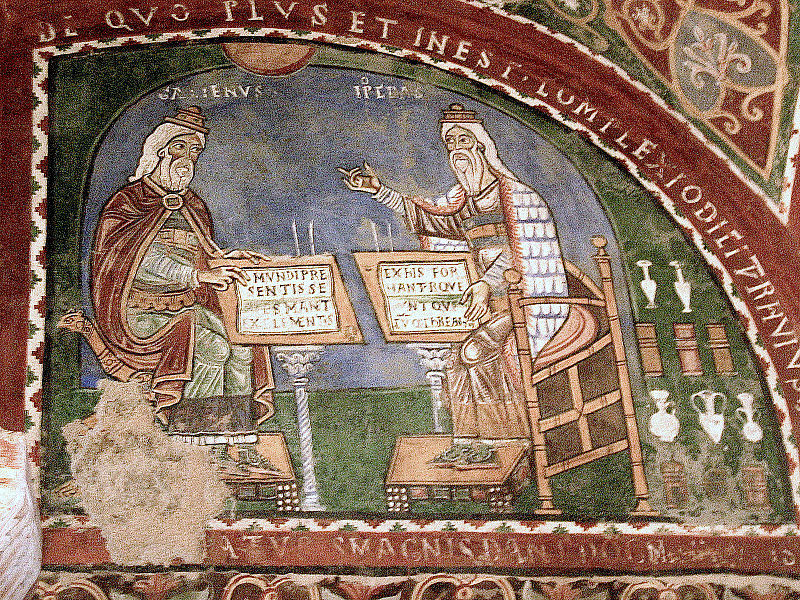 Mural painting showing Galen and Hippocrates. 12th century; Anagni, Italy (via Wikimedia Commons)
Mural painting showing Galen and Hippocrates. 12th century; Anagni, Italy (via Wikimedia Commons)
Mental health, psychology, neurology
Apart from physical (from physis “nature”) health, Ancient Greek medicine also studied mental health. Humorism, an Ancient Greek concept about the way the balance of bodily fluids affects not only a person’s health but also their temperament, became the dominant theory (theoría, from theoro “to look at, consider, speculate”, from thea “view” + horo “to see”) in Western medicine from the Middle Ages until as late as the mid-19th century. It is from this system (systema, from synistemi “to combine, organize”) that we have inherited words like humor, melancholy and phlegmatic (see Greek words in English – Part 1).
Note that, although Humorism and other related theories are based (from vasis “step, foundation”) on erroneous beliefs, these approaches marked a pivotal shift from supernatural explanations –which aggravated the stigma (“brand, mark”, from stizo “to mark”) of mental disorders by attributing them to divine disfavor– to naturalistic ones.
Psyche is the Greek word for “soul”; psychiatry as well as psychology, psychotherapy and psychoanalysis all derive their names from this word. The adjective psychosomatic derives from somatikos, “bodily”, while psychosis denotes a disorder with the use of the suffix “-osis” (see above, “Medical conditions”). There are numerous psychological phenomena and disorders described using Greek terms, whether these are neologisms (neos “new” + logos “speech”) or date back to Classical and Hellenistic times.
Hippocrates refusing the gifts of Artaxerxes, 1792, Anne-Louis Girodet de Roussy-Trioson
In ancient Greek, mania meant “madness” or a “state of frenzy”, often in the context of divine frenzy, but was also used by Hippocrates to describe a mental illness; apart from the eponymous behavioral disorder, the word is also used as a suffix in the names of several conditions and compulsive behaviors –such as pyromania, from pyr “fire”, or kleptomania, from kleptes “thief”–, or simply to signify a “craze”, as in “Beatlemania”. Another Hippocratic term is paranoia, from para “beside” + noos “mind”.
Catatonia derives from kata “down” + tonos “tone”; amnesia comes from the alpha privative + mimneisko “remember”; paraphilia comes from para “beside (also used to indicate abnormality)” + philia “love (also used for tendencies)”; agoraphobia comes from agora “place of assembly” + phobia “fear”. The term schizophrenia was coined by Eugen Bleuler from schizo “to split” + phren “mind, intellect”. The once-common medical diagnosis of “hysteria” (which is now completely outdated) derives its name from hystera “womb”.
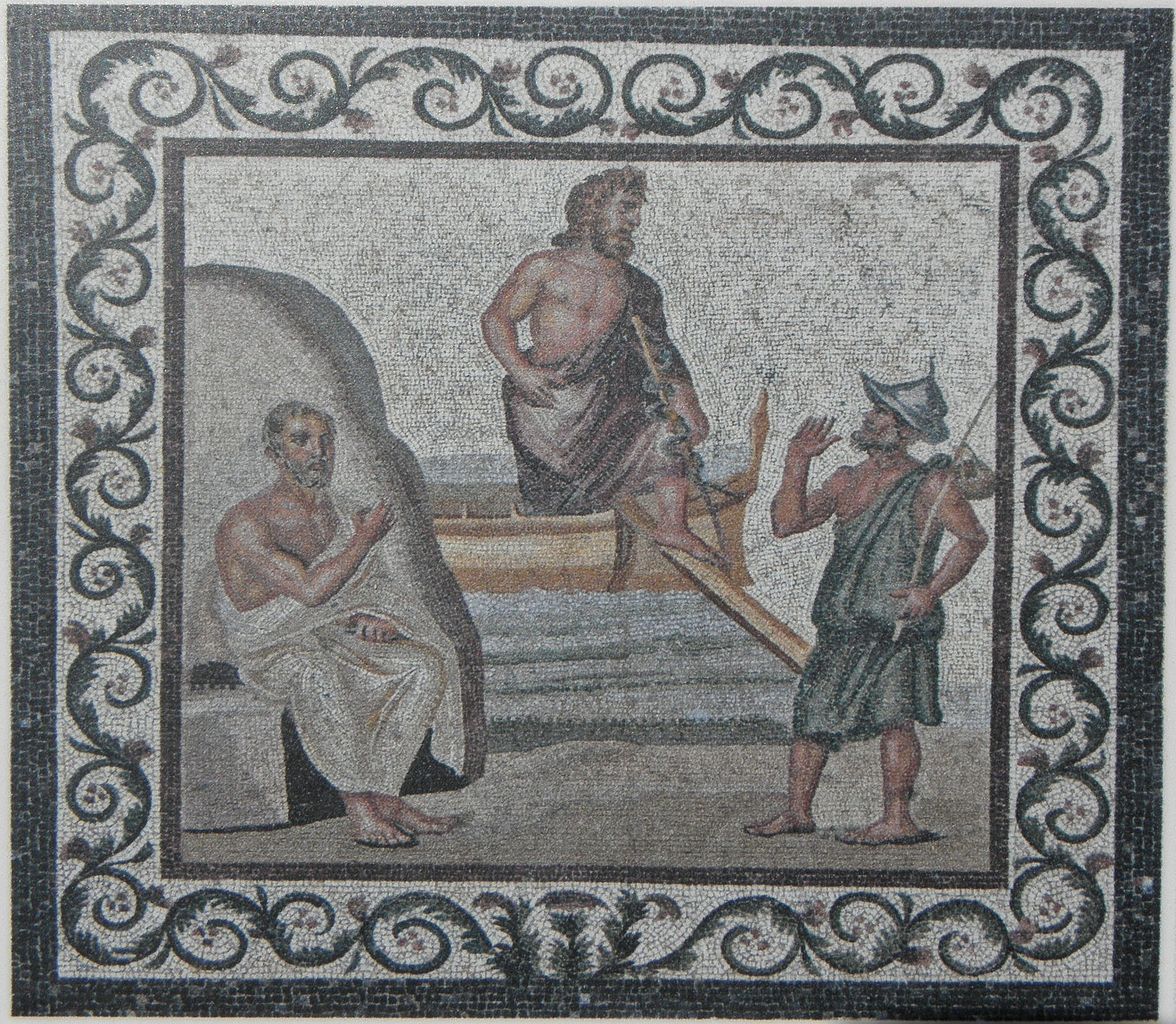 Hippocrates at the Asclepieion of Kos, with Asklepios in the middle, 2nd–3rd c., mosaic, Archaeological Museum of Kos (by Tedmek via Wikimedia Commons)
Hippocrates at the Asclepieion of Kos, with Asklepios in the middle, 2nd–3rd c., mosaic, Archaeological Museum of Kos (by Tedmek via Wikimedia Commons)
The term dysphoria literally means “pain, discomfort, distress”, from the prefix dys, indicating something negative or difficult + phero “to bear”; similarly, dysmorphia derives from dys + morphé “shape, form” – in Greek, it literally means “deformity”, hence the actual term for the psychological disorder is dysmorphophobia “fear of appearing deformed/flawed”. Anorexia derives from the alpha privative (with an “n” added before a vowel) + orexis “appetite”. Bulimia, on the other hand, derives from vous “ox” + limos “famine, great hunger”, hence denoting “the appetite of an ox” (or perhaps “the appetite to devour an entire ox”), thus only alluding to the bingeing part of the bulimic cycle (kyklos “circle”).
In the treatise “On the Sacred Disease”, part of the Hippocratic Corpus, we also find the first recorded observations of epilepsy (epilepsía, from epilamvano “to seize, overtake”, from epi “upon” + lamvano “to take”), with the author attributing the phenomenon (“that which is apparent”, from the middle voice of phainο “to show”) to an imbalance of bodily fluids, rejecting the then-prevalent metaphysical (meta “after, beyond” + physis) explanations. Today we know that its causes are in fact neurological (from neuro “nerve” + the suffix –logy [from logos]). Another neurological trait with a Greek name is autism, a term coined in 1912 by psychiatrist Paul Bleuler from autos “self”.
Read our entire series on “Common words you (probably) didn’t know were Greek”:
In “Part 1“: words about human character, animals, biology, geography and planets
In “Part 2“: words from the fields of music and theater, speech and writing, and education and sports
In “Part 3“: words from the fields of time and space, everyday objects, politics, but also crisis and war
In “Part 4“: words from the fields of religion & the supernatural, science & technology, and several miscellaneous entries
Read also via Greek News Agenda: Medical advancements in Ancient Greece and the Byzantine Empire; Georgios Papanicolaou | Paying Tribute to a medical pioneer and legend
N.M. (Intro image: Hygieia (lit. “health”), goddess of good health and sanitation, and her father Asklepios, god of medicine; Greek votive marble stele, late 5th c. BC, Vatican Museums [photo by Egisto Sani via flickr])

